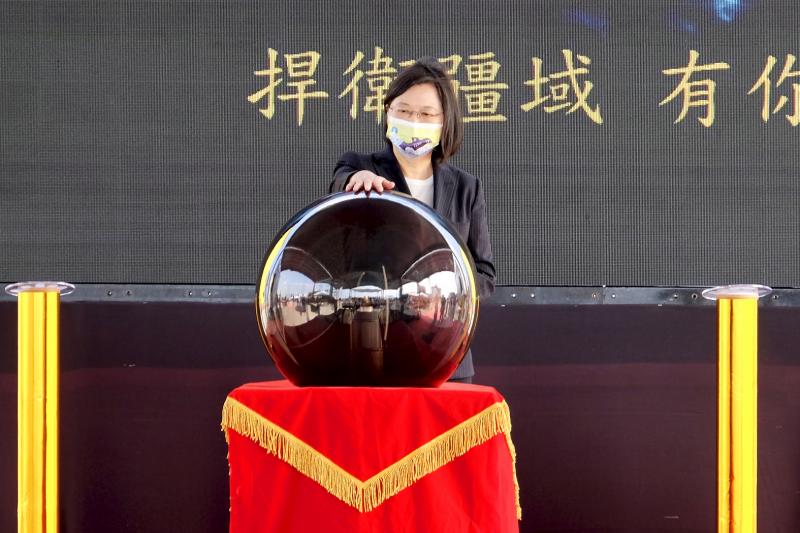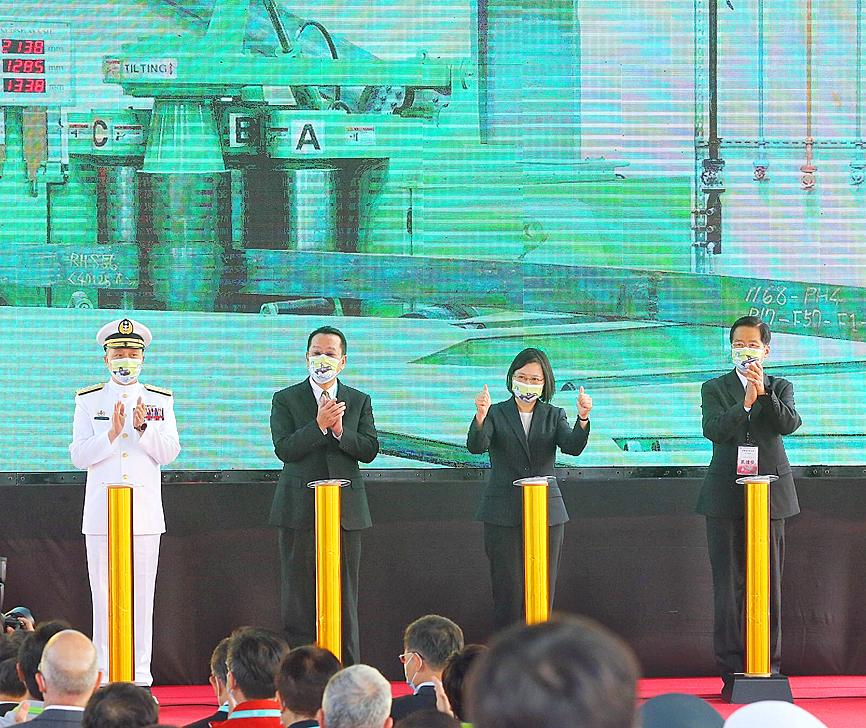President Tsai Ing-wen (蔡英文) yesterday presided over a ceremony to mark the start of construction of the nation’s first indigenous submarine at state-run shipbuilder CSBC Corp’s (台灣國際造船) shipyard in Kaohsiung.
“This submarine is an important part of allowing our navy to develop asymmetric warfare and to intimidate and block enemy ships from surrounding Taiwan’s main island,” Tsai said. “With the construction of the submarine to its future commission, we will certainly let the world know our persistence in safeguarding our sovereignty.”
Tsai has made boosting the nation’s indigenous defense capacity a central pillar of her defense policy. She recently relaunched the military aviation industry with the production of new trainer jets and has pushed for the development of more sophisticated systems by utilizing the domestic high-tech industries.

Photo: Wu Huizhong, AP
At the same time, she has gained approval from the US for the purchase of billions of US dollars in weapons, including upgraded F-16 jets, armed drones, rocket systems and Harpoon missiles capable of hitting ships and land targets.
China has stepped up military exercises toward Taiwan this year, flying fighter jets and reconnaissance planes on an almost daily basis toward the nation.
Taiwan turned to the expensive and time-consuming task of building its own submarines after Beijing prevented it from purchasing such craft from abroad through the use of economic and diplomatic threats.

Photo: CNA
Only a handful of countries around the world are capable of manufacturing submarines for modern warfare and Taiwan’s move toward that step has taken years. The Taiwanese submarine’s designs have reportedly drawn on foreign expertise, despite the obstacles thrown up by China.
CSBC was awarded the contract to design and build the subs in 2016, in partnership with arms developer the Chungshan Institute of Science and Technology.
Plans call for the building of eight indigenous submarines at an estimated cost of more than US$16 billion, with the first one to be completed by 2025.
The program, known as the Haichang Project (海昌計劃), has already faced criticism over its cost. The design phase itself was estimated to cost about NT$3 billion (US$104 million).
The submarine has been in the design stage for four years, overcoming all sorts of difficulties that could not be revealed to the public, CSBC chairman Cheng Wen-lon (鄭文隆) said yesterday.
The project is staffed by a team of about 200 technicians with an average age of only 34, making them “major assets” to the future of the domestic defense industry, he said.
Tsai conceded that the program was a struggle, but said her government would not be deterred.
“Walking on this path that historically the government has never taken before, there were all kinds of challenges, and we were met with all sorts of doubts, but challenges and doubts won’t defeat us,” Tsai said, standing in front of the workshop where the submarine parts are to be manufactured.
Minister of National Defense Yen De-fa (嚴德發), National Security Adviser Wellington Koo (顧立雄), American Institute in Taiwan Director Brent Christensen, legislators and members of the design team attended the ceremony.
Although Washington has no formal relations with Taipei, it remains Taiwan’s main ally, and US law requires the government to ensure that Taiwan can defend itself.
Weapons sales to Taiwan have increased in quantity and quality in the past few years, especially under US President Donald Trump’s administration.
Facing a potential Chinese foe with overwhelming superiority in missiles, soldiers, ships and planes, Taiwan has struggled to assure its own people, as well as the US, that it is capable of and willing to defend itself.
Along with the world’s largest standing military, numbering about 2 million members, China has the largest navy, with approximately 350 vessels, including two aircraft carriers and about 56 submarines.
It also possesses about 2,000 combat fighters and bombers and 1,250 ground-launched ballistic missiles, considered a key strategic and psychological weapon against Taiwan.
Taiwan’s armed forces are a fraction of that number, with much of its ground force consisting of short-term conscripts, and its fleet numbers only about 86 vessels, about half of them missile boats for coastal patrol.
The navy has just two combat-ready submarines, versions of the Zwaardvis-class subs purchased from the Netherlands in the 1980s in a deal that led to a major diplomatic rift between Bejing and The Hague.

CHAOS: Iranians took to the streets playing celebratory music after reports of Khamenei’s death on Saturday, while mourners also gathered in Tehran yesterday Iranian Supreme Leader Ayatollah Ali Khamenei was killed in a major attack on Iran launched by Israel and the US, throwing the future of the Islamic republic into doubt and raising the risk of regional instability. Iranian state television and the state-run IRNA news agency announced the 86-year-old’s death early yesterday. US President Donald Trump said it gave Iranians their “greatest chance” to “take back” their country. The announcements came after a joint US and Israeli aerial bombardment that targeted Iranian military and governmental sites. Trump said the “heavy and pinpoint bombing” would continue through the week or as long

TRUST: The KMT said it respected the US’ timing and considerations, and hoped it would continue to honor its commitments to helping Taiwan bolster its defenses and deterrence US President Donald Trump is delaying a multibillion-dollar arms sale to Taiwan to ensure his visit to Beijing is successful, a New York Times report said. The weapons sales package has stalled in the US Department of State, the report said, citing US officials it did not identify. The White House has told agencies not to push forward ahead of Trump’s meeting with Chinese President Xi Jinping (習近平), it said. The two last month held a phone call to discuss trade and geopolitical flashpoints ahead of the summit. Xi raised the Taiwan issue and urged the US to handle arms sales to

BIG SPENDERS: Foreign investors bought the most Taiwan equities since 2005, signaling confidence that an AI boom would continue to benefit chipmakers Taiwan Semiconductor Manufacturing Co’s (TSMC, 台積電) market capitalization swelled to US$2 trillion for the first time following a 4.25 percent rally in its American depositary receipts (ADR) overnight, putting the world’s biggest contract chipmaker sixth on the list of the world’s biggest companies by market capitalization, just behind Amazon.com Inc. The site CompaniesMarketcap.com ranked TSMC ahead of Saudi Aramco and Meta Platforms Inc. The Taiwanese company’s ADRs on Tuesday surged to US$385.75 on the New York Stock Exchange, as strong demand for artificial intelligence (AI) applications led to chip supply constraints and boost revenue growth to record-breaking levels. Each TSMC ADR represents

Pro-democracy media tycoon Jimmy Lai’s (黎智英) fraud conviction and prison sentence were yesterday overturned by a Hong Kong court, in a surprise legal decision that comes soon after Lai was jailed for 20 years on a separate national security charge. Judges Jeremy Poon (潘兆初), Anthea Pang (彭寶琴) and Derek Pang (彭偉昌) said in the judgement that they allowed the appeal from Lai, and another defendant in the case, to proceed, as a lower court judge had “erred.” “The Court of Appeal gave them leave to appeal against their conviction, allowed their appeals, quashed the convictions and set aside the sentences,” the judges